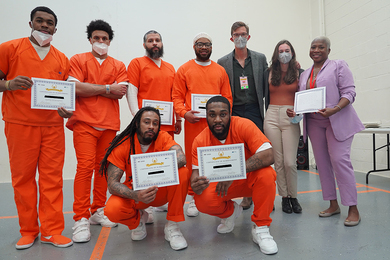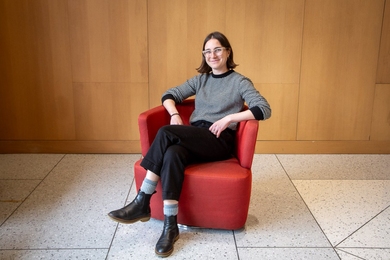The winter/spring 2007 issue of TheatreForum magazine, a prestigious venue for new works of drama, will include a script by Laura Harrington, lecturer in theater arts at MIT since 1995. Harrington's play "N (Bonaparte)," which premiered at Boston's Pilgrim Theatre Company in 2005, is a tragicomedy about the deposed French emperor, set on the island of St. Helena where Napoleon is in exile. Among its characters are an Irish doctor, a pandering valet, the dead empress Josephine, Joan of Arc and a lot of rats. For much of the play, Napoleon reposes (fully clothed) in a bathtub.
A great deal of MIT talent went into the Pilgrim Theatre production of "N." The director, Kim Mancuso, and the theatre's managing director, Kermit Dunkelberg, are current and former lecturers at the Institute, respectively. MIT students and graduates played many of the roles, including a fair share of the rats. Both the stage manager and the lighting designer were Institute alums.
Harrington's work is intimately bound up with sound and music. She has written half a dozen musicals and is among the few living artists writing libretti for opera. Her libretto for "Resurrection," first produced in 1999 by the Houston Grand Opera, was set to music by Tod Machover, head of MIT Media Lab's Hyperinstruments/Opera of the Future group. She is currently at work on a new musical, "Out of the Blue," with the award-winning composer Jenny Giering. "Out of the Blue" was commissioned and workshopped at Suffolk University in 2006 and has just won a spot in the Penn State University New Musicals Festival for April 2007. She is also executing a commission for a musical monologue and is in the early stages of research for a new opera.
Harrington recently discussed the TheatreForum publication, "N" and her current and past projects.
Q: How does "N" fit among your recent works?
A: I think of "N" as the third play in a loosely formed trilogy about war. "Hallowed Ground," set during the last days of the Civil War, puts us on the ground with four very young characters (ages 15 through 19) following a battle. I wanted to explore the experience and cost of war through the bodies and voices of young soldiers who are fighting and young women who find themselves in the path of the battle. "Pickett's Charge" is a modern comedy about Civil War re-enactors who get their fondest wish and fall through a hole in time. Looking at war through the lens of re-enactors gave me a chance to explore our love affair with war.
Q: How does "N" differ from your other plays?
A: With "N," I wanted to explore the idea that violence is like a virus cascading through the centuries. And this time I wanted to deal with the men in power, the generals. Napoleon thought of himself as one of the great generals of all time and compared himself to Caesar, Hadrian, etc. The idea of the most famous human being on the planet imprisoned on a rock in the middle of the ocean, surrounded by rats, was just too delicious to pass up. Here is the hubris of empire brought low.
Q: What was your creative starting point with "N"?
A: The inciting image for this play was Napoleon in his bathtub on St. Helena. It was a lead tub, the room was very dark. The longer he was on St. Helena, the more time he spent in the bath. It is said that his hand wore a groove in the side of the tub from rubbing it so much.
What's unique and special about this play for me is the use of sound and actor-created sound effects. My profound desire is to create illusion and to explore all the different ways it is possible to do this: from artfully imitating reality in a play like "A Streetcar Named Desire" to the intense artifice of musicals and operas, where the audience is seduced into the illusion by riding the sensual wave of the music, to "N," where, like magicians, we show you the elements of the "magic"--and still somehow pull off the sleight of hand. The invitation to imagine, the invitation to come on along and play with us, is powerful…
Q: What inspires you to explore history in your work?
A: We live in a society that has amnesia when it comes to history. This is a very dangerous habit. I love the story that JFK was reading Barbara Tuchman's "The Guns of August" during the Cuban missile crisis. I'm not sure what George W. Bush reads; but there's certainly no evidence that he reads or understands history.
A version of this article appeared in MIT Tech Talk on February 28, 2007 (download PDF).






